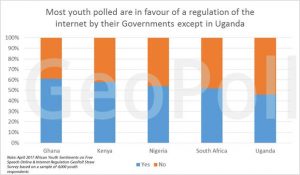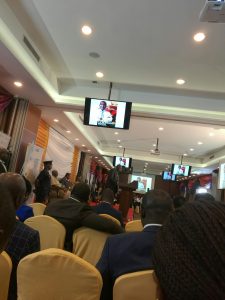 Nairo, Kenya, May 18, 2017/- Latest survey conducted GeoPoll, world’s largest real-time mobile survey platform has revealed that 61 percent of Ghanaian youth are in favour of government regulating the use of social media.
Nairo, Kenya, May 18, 2017/- Latest survey conducted GeoPoll, world’s largest real-time mobile survey platform has revealed that 61 percent of Ghanaian youth are in favour of government regulating the use of social media.
This is contrary to the position of nongovernmental organisations (NGOs), civil society organisations, the international community, among others.
In June last year, the police leadership in Ghana had threatened that during the elections, there was the potential to shutdown the internet because of what people could use it to do. But the government came out to assure the citizens and the international community that it won’t shutdown the internet during the December elections. It went peaceful without any violence.
The GeoPoll which covered majority of youth in Ghana, Kenya, Nigeria, South Africa, and Uganda, maintained that “they do not mind regulation of the internet by their governments”.
When asked if governments should regulate the use of social media, 54 percent of respondents believed the government should regulate social media, while 46 percent indicated they did not want the government to regulate social media.
Ghana has the highest number of respondents (61%) who favour the government regulating the use of social media followed by Kenya (58%), Nigeria (54%), South Africa (52%), with the least being Ugandans with only 46% supporting a regulation.
When asked why they would support a government regulation of social media, most (24%) felt that a regulation would be effective in preventing hate speech. Kenya has the highest percentage of youth who picked hate speech as the reason for regulation at 36%.
35 percent of Africa’s population between the ages of 15 and 35 years say they are growing up in a more connected world—with mobile phones, access to the internet, and engaged in social media, according to the survey.
As these connections become more common place, GeoPoll polled more than 4,000 youth to understand their perceptions on social media, internet regulation, and free speech.
In GeoPoll’s first of two segments of this analysis, it dug into youth’s perception of their rights and the role of government with regard to free speech and social media.
85 percent of respondents from the five surveyed five countries stated that they consider free speech online a human right.
GeoPoll then asked respondents to rate the level of free speech in their country on the following scale: very free, somewhat free, neutral, less free, and not free.
Sixty-three percent of respondents found the level of free speech in their country to be free (38% very free and 25% somewhat free). Only 14 percent of respondents find the level of free speech in their country to be less or not free (10% less free and 4% not free). Among the five countries polled, 64 percent of Ghanaians reported “very free,” the highest level among all countries. Conversely, Nigerians and Ugandans made up two-thirds of all respondents who indicated less free and not free.
GeoPoll then sought to understand perceptions of free speech as it relates to social media. Among the 4,213 respondents from all five selected countries, 17 percent of respondents indicated they posted more than 20 times a week on social media, 10 percent noted they posted to social media between 11 and 20 times, and 28 percent said they posted to social media between 6 and 10 times per day.
Forty-five percent of respondents responded they only posted to social media less than 5 times a day. Ghana (20%), South Africa (19%), and Uganda (19%) had a larger share of respondents who post on social media more than 20 times per week when compared to Nigeria (16%) and Kenya (14%).
When asked if one has shared or shares their political views on social media, GeoPoll found respondents split nearly down the middle. Fifty-four percent of respondents said they had not/did not share their political views on social media, while 46 percent said they had or did. Out of the five countries surveyed, Nigerian respondents are more likely to share their political views on social media (51%) compared to their Ghanaian counterparts (31%).
Respondents were asked to rate the following statement, “Social Media makes it easier to post and see hate speech” on a scale from I strongly agree, to, I strongly disagree. Eighty-nine percent of all respondents agreed that it is easier to post and see hate speech on social media (41% “I strongly agree”, 40% “I somewhat agree”, 7% “I agree”). In South Africa, over half of respondents (55%) indicated they strongly agreed to the statement.
African Eye Report





